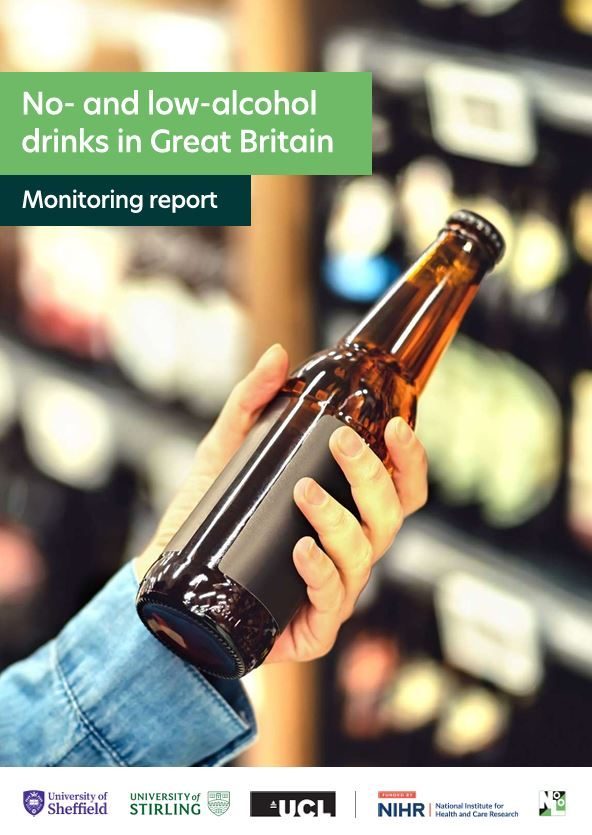No/Lo Project
Evaluating and responding to the public health impact of no and low alcohol drinks: A multi-method study of a complex intervention in a complex system
Introduction
The No/Lo Project investigates whether non-alcoholic or low-alcohol drinks can improve people's health. These drinks are beers, ciders, wines, spirits that are alcohol-free or contain a little alcohol. We call them no/lo drinks.
No/lo drinks are increasingly popular, but whether they improve public health depends on many factors, such as:
- who drinks them?
- do people drink them instead of normal alcohol?
- do they help or harm people in other ways?
For example, adverting no/lo drinks could also advertise normal alcoholic drinks made by the same company. This might harm people by encouraging them to drink more alcohol.
Adverts might also encourage children to drink earlier or make it harder for people with alcohol problems to stop drinking.
Many organisations are trying to make it easier to buy no/lo drinks, for example:
- alcohol companies are making and advertising new drinks
- the government charges less tax on no/lo drinks
- some public health charities encourage people to try no/lo drinks if they want to reduce drinking
Each of these organisations also influences how the other organisations behave. We want to know more about what these organisations are doing to make no/lo drinks easier to buy. We also want to know how that influences health and what we could do in future to make sure that no/lo drinks improve health.
Work Packages
The No/Lo Project is split into four Work Packages (WP):
Research team
The study is led by John Holmes, Professor of Alcohol Policy at the School of Medicine and Population Health at the University of Sheffield. The team includes colleagues from the University of Sheffield, University of Stirling and University College London (UCL), and has worked together for over ten years on research projects examining alcohol consumption and health.
Civil servants, public health charities and members of the public helped us to design this project. During the project, the public will also help to design and test our research materials, and interpret and share our results.
Key project information
This study is funded by the NIHR Public Health Research programme (NIHR135310). The views expressed are those of the author(s) and not necessarily those of the NIHR or the Department of Health and Social Care.
Dates
July 2022 – December 2026
Funding
£2,190,613.62
Principal investigator
Professor John Holmes
Institutions involved
University of Sheffield
University of Stirling
University College London
Key contact
No- and low-alcohol drinks in Great Britain: Monitoring report
Published January 2024
This report summarises key trends in the sales and consumption of no/lo drinks.
The report draws on our analyses of commercial market research data and our own survey data to provide a detailed description of the no/lo drinks market in Britain, who drinks these products and how that is changing over time.
It also offers insights into key topics including pricing, market concentration and differences between the off-trade and on-trade sectors.

Publications
Critchlow N, Morgan A, Angus K, Howell R, Fitzgerald N, Kersbergen I, Holmes J (2025) Development of the alcohol-free and low-alcohol drinks market in Great Britain from 2011 to 2022: Narrative timelines based on a documentary review of off-trade retail magazines and market intelligence reports Drug & Alcohol Review DOI: https://doi.org/10.1111/dar.14058
Wilson LB, Stevely AK, Kersbergen I, McGrane E, Moore EC, Pryce RE, Brown J, Holmes J (2025) Current and future trends in the consumption, sale and purchasing of alcohol-free and low-alcohol products in Great Britain, 2014 to 2023 Addiction DOI: https://doi.org/10.1111/add.70041
Perman-Howe PR, Holmes J, Brown J, Kersbergen I (2024) Characteristics of consumers of alcohol-free and low-alcohol drinks in Great Britain: A cross-sectional study Drug and Alcohol Review DOI: https://doi.org/10.1111/dar.13930
Critchlow N, Holmes J, Fitzgerald F (2024) Alibi marketing? Surrogate marketing? Brand sharing? What is the correct terminology to discuss marketing for alcohol-free and low-alcohol products which share branding with regular strength alcohol products? Addiction DOI: https://doi.org/10.1111/add.16504
Holmes J, Angus C, Kersbergen I, Pryce R, Stevely A, Wilson L (2024) No- and low-alcohol drinks in Great Britain: Monitoring report Sheffield: University of Sheffield. DOI: 10.15131/shef.data.24893526 Download the accompanying data tables.
Other media
February 2025, Bright Minds – What's the point of a pint without alcohol in it? In this webinar Lucy Burke speaks about her PhD research on drinking motives, no/lo drinks and the implications for health inequalities. The webinar also features a lengthy Q&A where Lucy and Colin Angus answer questions on a range of topics including alcohol harms, no/lo consumption trends and drink driving.
March 2024, Alcohol Alert – March 2024 John Holmes speaks on the Institute of Alcohol Studies podcast about alcohol-free and low-alcohol drinks.
January 2024, Are consumers paying a premium for no- and low-alcohol drinks? Colin Angus writes for the Society for the Study of Addiction's blog
January 2024, No- and low-alcohol drinks – a growing market that could change public health but challenges remain John Holmes writes for the Alcohol Change UK blog following the release of the No- and low-alcohol drinks in Great Britain: Monitoring report.
You might also be interested in…
SARG's Lucy Burke wins Open Research Prize 2025
Lucy Burke, a Qualitative Research Associate and PhD Student with the Sheffield Addictions Research Group (SARG), has been awarded the University of Sheffield Open Research Prize 2025 in the Postgraduate Researcher (PGR) category.
SARG showcases research at School of Medicine and Population Health event
Researchers from SARG are set to showcase their work at the University of Sheffield's School of Medicine and Population Health Research and Innovation Meeting 2025.
SARG Heads to Glasgow for 50th Anniversary KBS Symposium
A team of twenty researchers and PhD students from the Sheffield Addictions Research Group (SARG) will be participating in the landmark 50th Anniversary KBS Symposium for Social and Epidemiological Research on Alcohol next month.

